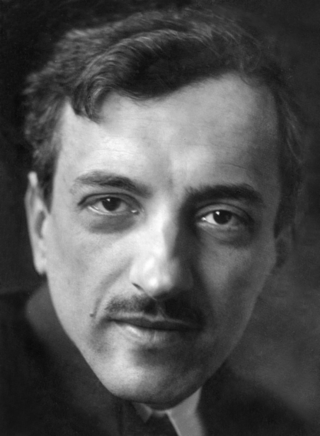Top Qs
Timeline
Chat
Perspective
List of compositions by Borys Lyatoshynsky
From Wikipedia, the free encyclopedia
Remove ads
This is an incomplete list of compositions by the Ukrainian composer Borys Lyatoshynsky.

Lyatoshynsky wrote a variety of works, including five symphonies, symphonic poems, and several shorter orchestral and vocal works, two operas, chamber music, and a number of works for solo piano.[1][2] He wrote music with a modern European style and technique, skilfully combining it with Ukrainian folk music themes.[3] His musical style later developed in a direction favoured by the Russian composer Dmitri Shostakovich,[4] which caused significant problems with Soviet critics of the time, and as a result Lyatoshynsky was accused of formalism and the creation of degenerative art.[5]
Lyatoshynsky's main works are his operas The Golden Ring and Shchors, the five symphonies, the Overture on Four Ukrainian Folk Themes (1926), the suites Taras Shevchenko (1952) and Romeo and Juliet (1955), the symphonic poem Grazhyna (1955), his "Slavic" concerto for piano and orchestra (1953), and the completion and orchestration of Reinhold Glière's violin concerto (1956).[6] He composed film scores for such films as Carmelite (1931), Ivan (1932, with Yuliy Meitus), Taras Shevchenko (1951), Ivan Franko (1956, with Mykola Kolessa), and Grigory Skovoroda (1959).[6] Many of his compositions were rarely or never performed during his lifetime.[5]
Remove ads
List of works by genre
Summarize
Perspective
Orchestral
Transcriptions
- Lysenko's opera Taras Bulba (with L. Revutsky)
- Lysenko's opera Aeneid.[3]
- Gliere's Violin Concerto (with K. G. Mostras)
- Gliere's Comedians[3]
- Gliere's Shah-Senem[3]
- Gliere's ballet Red Poppy[3]
Chamber
Solo piano
Choral/vocal
Song cycles without an opus number
- Songs after Shevchenko (including "Water flows into the blue sea" (Тече вода в синє море, Teche voda v synye more); 2 "The sun rises from behind the grove" (Із-за гаю сонце сходить, Iz-za hayu sontse skhodytʹ)). 1949–1951.[45]
- Two songs ("When the well shakes"; "How will you hear at night"). Lyrics by Franko.[citation needed]
- Songs to texts by Shevchenko (1 "A banner behind a banner" (За байракомбайрак, Za bayrakom bayrak)); 2 "On the Dnieper Saga" (Над Днiпровою сагою, Nad Dniprovoyu sahoyu)). 1960.[43]
- Two Ukrainian folk songs ("Oh, a quiet wind is blowing in the field" (Ой, у полі тихий вітер віє, Oy, u poli tykhyy viter viye)); "Oh, a long time ago". 1934.[8]
- Songs for mixed choir accompanied by piano (1 "Thought about the Cossack Sophron" (Дума про козака Софрона, Duma pro kozaka Sofrona)); 2 "About Karmelyuk" (Про Кармелюка, Pro Karmelyuka)). 1932.[46]
Individual songs with no opus number
- "Airship" (Воздушный корабль, Vozdushnyy korablʹ).[16]
- "And in those small houses" (А у тих багачок, A u tykh bahachok).[16]
- "Bygone days" (Минувшие дни, Minuvshiye dni). 1931. Romance after Shelley.[45]
- "Haze" (Серпанок, Serpanok). 1919–1920. From a text by Balmont; also set in Russian.[16]
- "Heart of the Kobzar" (Серце Кобзаря, Sertse Kobzarya).[43]
- "In the album of Caroline Janisz" (В альбом Кароліні Яниш, V alʹbom Karolini Yanysh).[16]
- "I walked in the crossroads" (У перетику ходила, U peretyku khodyla).[16]
- "I was a guest in your heart" (Гостював в твоєму серц, Hostyuvav v tvoyemu sertsii). 1924.[28]
- "Oh, if my heart is cold" (Якби мені серце холодне, Yakby meni sertse kholodne). 1924. Words by Balmont.[28]
- "Sum of spring" (1919–1920). Весна грустит Vesna grustit [16]
- "Terrible is the cold of the evenings" (Жахливий холод вечорів, Zhakhlyvyy kholod vechoriv). 1926.[28]
- Testament. 1939. Cantata after Shevtchenko.[3]
- "The grove turns green again" (Знову гай зазеленів, Znovu hay zazeleniv). 1922–1924.[39]
- "The heart of the Kobzar" (Серце Кобзаря, Sertse Kobzarya). 1964. Words by Valentin Bychko.[43][42]
- "The monk's mountain" (Чернеча гора, Chernecha Gora). 1964. Words by Evgeny Fomin.[43]
- "There are brown eyes" (Єсть карії оч, Yestʹ kariyi ochii). 1927. Text by Shevchenko.[45]
- "The silence and fragrance of sleeping flowers" (Тиша й пахощі квітів у дрімоті, Tysha y pakhoshchi kvitiv u drimoti). 1922.[39]
- "The sorrow of spring" (Сум весни, Sum vesny). 1919–1920.[39]
- "The sun" (Солнце, Solntse). Words by Lermontov.[16]
The following songs need to be sourced:[citation needed]
- "Creeping, periwinkle".(Та стелись, стелись, барвиночку, Ta stelysʹ, stelysʹ, barvinochku)
- "Glorious Way". 1939
- "My dreams fade in solitude" (В'януть мрії мої в самоті, Vʺyanutʹ mriyi moyi v samoti)
- "Old and young" (Старий i молода, Staryy i moloda).
- "Our comrade-in-arms fell under the birch". 1950. Lyrics by Anatoly Sofronov.
- "Silence, the fragrance of dormant flowers".
- "The moon creeps across the sky".
- "The sun rises over Siberia" (За Сибiром сонце сходить, Za Sybirom sontse skhodytʹ).
- "The sun rises at the horizon", after Shevtshenko.
- "Yesterday was Saturday night" (Вчора була суботонка, Vchora bula subotonka).
Wind band
- Solemn March (1931) [47]
- March for marching band (1932)
- March to the Ukrainian folk tunes for marching band (1936)
Remove ads
Notes
References
Sources
External links
Wikiwand - on
Seamless Wikipedia browsing. On steroids.
Remove ads

